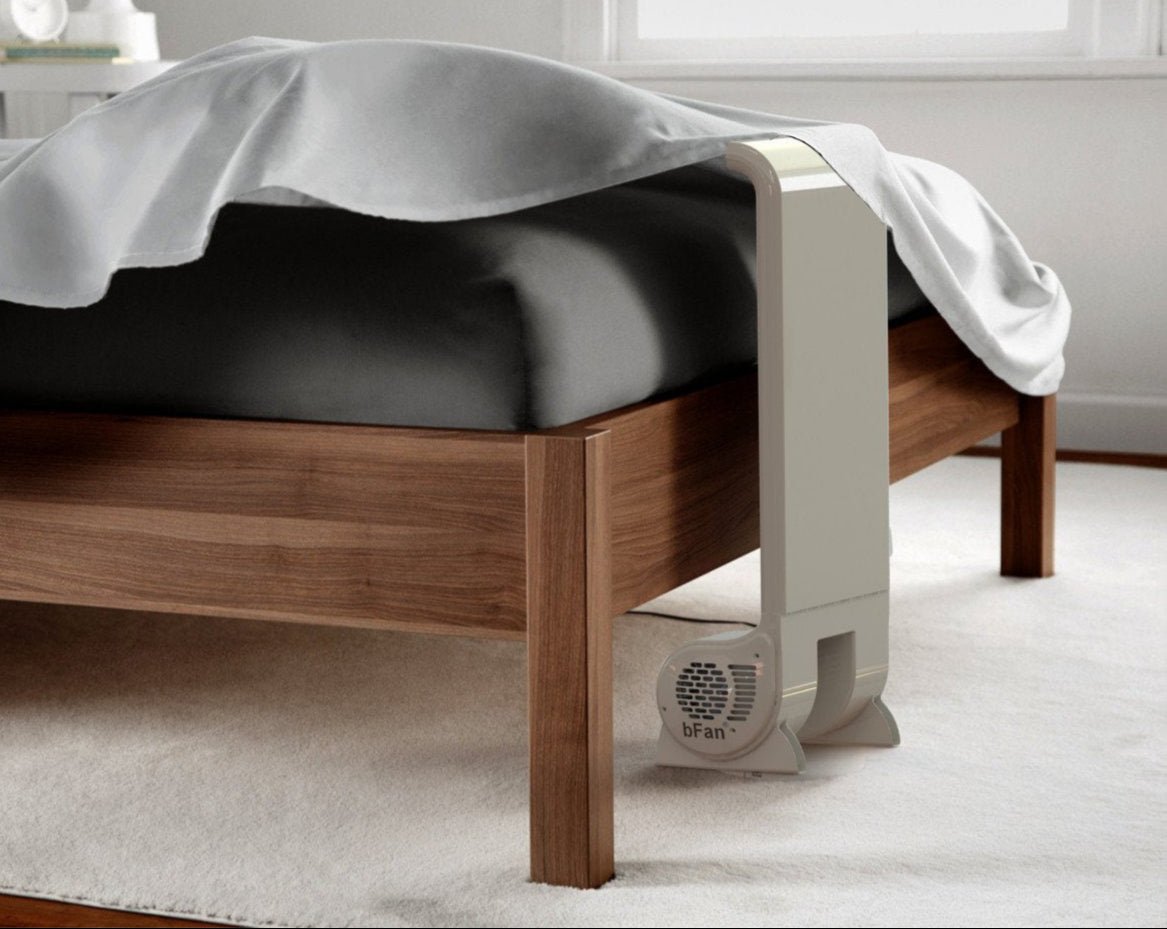Mastering Hyperthyroidism: Tackling Night Sweats with Bedfan Technology
Imagine waking up in the middle of the night, drenched in sweat. It's an uncomfortable and all-too-common phenomenon for those battling the challenges of hyperthyroidism. But controlling night sweats can be more than just a battle against the clock: it's a journey toward better sleep and overall well-being.
The Science Behind Hyperthyroidism and Night Sweats
Hyperthyroidism is a condition where the thyroid gland produces an excess of thyroid hormone, leading to a process known as thyrotoxicosis, or a toxic reaction to excessive thyroid hormone. This can cause many symptoms, but perhaps one of the most disruptive is night sweats, which are episodes of excessive nighttime sweating.
Understanding the Thyroid's Role
The thyroid is a small, butterfly-shaped gland located just below your Adam's apple. Despite its size, the hormones it secretes play a crucial role in regulating the body's metabolism. An overactive thyroid can rev up many of the body's systems, causing an increase in metabolism, which can lead to sweating, especially at night when you're under the covers.
Connection Between Hormones and Hypothalamus
The hypothalamus, a part of the brain, regulates body temperature. When the thyroid overproduces hormones, it can trick the hypothalamus into thinking the body is too hot, initiating a cooling response, which includes sweating, even though the temperature isn't actually elevated.
Risks of Disrupted Sleep from Hyperthyroidism
The impact of night sweats goes beyond the inconvenience of damp sheets and sleep interrupted. Sleep is vital for physical recovery and mental well-being. Disrupted sleep can lead to:
- Fatigue
- Increased Anxiety
- Concentration Difficulty
- Compromised Immune Function
- Aggravated Thyroid Symptom
The Cyclical Nature of Sleep Disruption
Fatigue from disrupted sleep can often lead to a vicious cycle, as increased tiredness during the day can cause napping, which can then disrupt the body's natural sleep cycle.
Anxiety as a Consequence
One of the hallmark symptoms of an overactive thyroid is increased anxiety, which is only exacerbated by inadequate sleep. Addressing night sweats can, therefore, help tackle multiple symptoms of hyperthyroidism.
Lifestyle Changes to Manage Night Sweats
Thankfully, there are strategies and lifestyle changes that can help manage night sweats. These include:
- Creating a Comfortable Sleep Environment: Keeping the bedroom cool and using moisture-wicking bedding can help regulate temperature and absorb sweat.
- Timing Your Meals and Medication: Avoid eating or taking medication within a few hours of bedtime to minimize the heat produced by metabolism.
- Regular Exercise: Regular activity can help regulate the body's systems and reduce the overall stress that can exacerbate night sweats.
- Stress Management Techniques: Night sweats can be triggered by emotional or psychological stress. Techniques such as meditation or breathing exercises can help you relax before bed.
The Bedfan Solution
While these lifestyle changes can be beneficial, many individuals with hyperthyroidism still struggle with night sweats. This is where innovative solutions like the Bedfan come into play.
What is the Bedfan?
The Bedfan is a unique and patented cooling system designed to provide relief from night sweats. It is a fan unit that sits at the foot of the bed and quietly cools the body with a gentle breeze, creating a personal cooling zone beneath the sheets.
How Does the Bedfan Work with the Body's Natural Cooling Mechanism?
The Bedfan isn't just about blowing air around; it's about working with the body's natural cooling mechanisms without chilling the entire room. It can help counteract the excess heat generated from an overactive thyroid and greatly improve the comfort of sleep.
Benefits Beyond Night Sweats
The relief from night sweats is only part of the story. By promoting more restful sleep, the Bedfan can help with managing anxiety, maintaining a regular sleep schedule, and overall enhancing the quality of life for individuals with hyperthyroidism.
Testimonials from the Hyperthyroidism Community
The best way to understand the impact of using a Bedfan for hyperthyroidism is through the experiences of those who have incorporated it into their lives.
Real-Life Stories of Improved Sleep and Comfort
Countless individuals have shared how the Bedfan has transformed their nights, allowing them to enjoy uninterrupted sleep, waking up refreshed, and ready to tackle the day.
A Tool Recognized by Physicians
It's not just patients who are praising the Bedfan; physicians specializing in sleep and endocrinology have begun to recommend it as a valuable tool in managing hyperthyroidism.
Final Thoughts: Embracing the Journey to Better Sleep
Managing the symptoms of hyperthyroidism, including night sweats, is a multi-faceted challenge that requires a combination of medical management and practical coping strategies. The Bedfan represents an elegant solution that can significantly enhance the sleep experience for those dealing with night sweats.
Taking the First Step
If you or someone you know is affected by hyperthyroidism, consider the benefits of integrating the Bedfan into your sleep routine. It's important to consult with a healthcare professional about your individual needs, but the stories from the hyperthyroidism community paint a picture of genuine relief and better sleep quality.
Continuous Efforts Toward a Balanced Life
Remember, the key is not to let hyperthyroidism, or any health condition, define your quality of life. By proactively addressing symptoms such as night sweats, you're not just managing a condition, you're crafting a better future filled with more restful nights and energized days.
In the journey towards well-being, every small step counts. And waking up without drenched sheets could be the first step to reclaiming comfortable, uninterrupted sleep. So reach for that fan, create your perfect sleep environment, and let's turn those restless nights into restorative retreats.
Share

